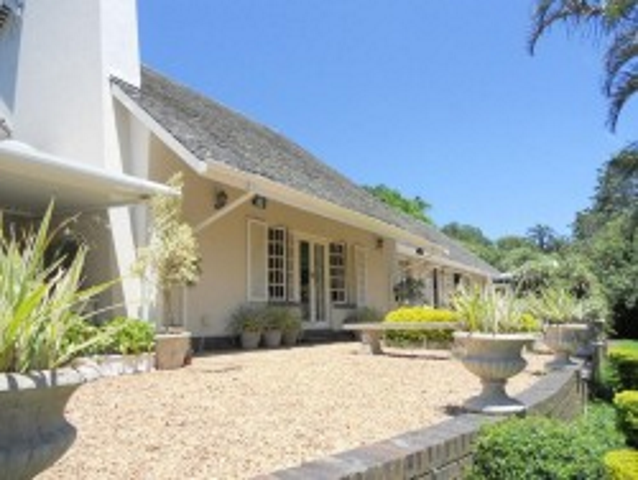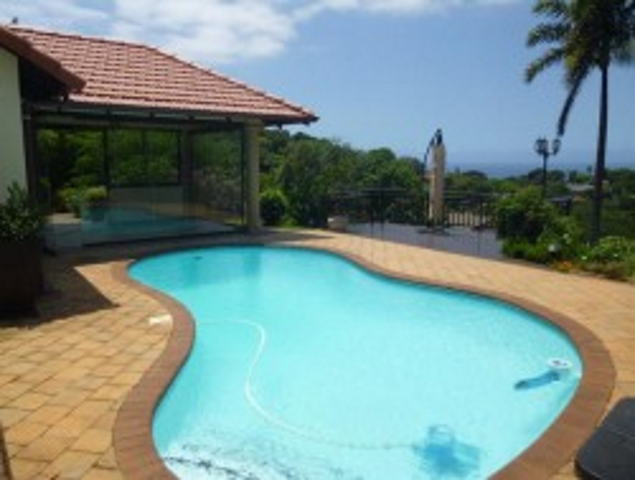Choosing a neighbourhood for your family is a big decision. There are so many factors to consider: lifestyle, convenience, distance to school and work, and price. It’s not always easy to know what you’re getting in a new neighbourhood, especially if you’re not familiar with the city.
 Situated in Kloof, this home offers three bedrooms, three and a half bathrooms, two lounges plus a study, an entertainment area, built-in braai, swimming pool and a granny flat. It is on the market for R3.495 million – click here to view.
Situated in Kloof, this home offers three bedrooms, three and a half bathrooms, two lounges plus a study, an entertainment area, built-in braai, swimming pool and a granny flat. It is on the market for R3.495 million – click here to view.This is according to David Hitch, Rawson Property Group’s franchisee for Kloof, who recommends the Upper Highway area for families who enjoy a lush, natural environment with plenty of room to play.
He says it’s an affluent area, out of the humid Durban climate, and is green and treed with lots of great facilities. It has everything from golf clubs to equestrian and lifestyle estates, as well as shops and restaurants and great schools.
Largely centred in Hillcrest and Kloof, schools include Kloof Junior and Senior Primary, Kloof High, Thomas More College, St Mary’s DSG, Hillcrest Primary and High, Winston Park Primary, Highbury Preparatory, Curro Hillcrest, Waterfall College and Kearsney College.
Hitch says property prices average at around R1.8 million to R2 million, with anything under R2 million moving fast. There is a slight shortage of stock and an increasing demand for lock-up-and-go type properties. The rental market is also strong, with an average family home renting for between R12 000 to R15 000 a month, he says.
While residents are mixed, many are drawn to the area for its space and natural beauty, and the hikes, birdlife, horse-riding and cycling opportunities are a strong draw for active families.
 This La Lucia house has three bedrooms, three bathrooms, a kitchen with state-of-the-art appliances, a bar area, sea views and two garages. It is priced at R3.9 million – click here to view.
This La Lucia house has three bedrooms, three bathrooms, a kitchen with state-of-the-art appliances, a bar area, sea views and two garages. It is priced at R3.9 million – click here to view.Closer to Durban Central, but still outside the city is Berea. This cosmopolitan suburb is along a ridge and many of its properties offer spectacular views over the Indian Ocean.
Bradley Bougardt, the Rawson Property Group’s franchisee in Berea, says buyers tend to be split into three main groups. There are quite a few retired couples living in big, old-style Durban homes, then there are wealthy businessmen buying properties in the area to renovate, and finally, there are young, first-time buyers with families who are drawn to the area because of its convenient location, excellent nightlife and restaurants, and numerous schools.
Well-known schools in the area include Marris Stella, Durban Girl’s High, DHS, Glenwood, Gordon Road Girls’ School, Clifton and Penzance, among others.
Bougardt says it’s a good investment as well as a great place to live, and first-time buyers often see the best returns in the area, at 8% to 9% at the lower end of the market. As for prices, they range from R550 000 all the way to R7 million, depending largely on the size of the property and the views it may offer.
 This Hillcrest home offers three bedrooms, two bathrooms, an open plan lounge, rock swimming pool, landscaped garden and garaging for two cars. It is currently on the market for R3.75 million – click here to view.
This Hillcrest home offers three bedrooms, two bathrooms, an open plan lounge, rock swimming pool, landscaped garden and garaging for two cars. It is currently on the market for R3.75 million – click here to view.Bougardt says there is also a huge demand for rental properties, but nowhere near enough stock. Rentals for a typical family home range from R14 000 to R16 000 per month and buy-to-let owners are seeing returns of around 4.5%.
For families looking to be close to the beachfront, Durban North comes highly recommended by Robert Kermack, Rawson Property Group’s Principal for Durban North.
He says there is a huge variety of schools in and around Durban North, including Chelsea Preparatory, Northwood Boys’, Northlands Girls’, Crawford College, Danville Park Girls High, Our Lady of Fatima and Victory Christian Academy.
The neighbourhood is made up of several smaller suburbs, all of which are conveniently located with easy freeway access, shops, restaurants and entertainment nearby.
Kermack says the La Lucia area is at the top-end of the Durban North market, with Red Hill and Park Hill at the lower end. It is generally an upmarket neighbourhood, and average prices sit at around R1.8 million. The core market, however, is between R2.2 million and R3.5 million, he says.
“Rentals are also popular, and you’ll find everything from flats, duplexes and townhouses to freestanding homes to rent. You’ll pay between R12 000 to R15 000 per month to rent an average house, but you can find properties renting for up to R50 000.”
Durban North’s suburbs are all well established and leafy, with an average stand size of 1 000sqm, and several original houses going back 60 to 70 years. Kermack says there is a lot of upgrading happening and there’s plenty of variety.
That variety extends to the suburbs’ residents as well, and the average age of owners in the area has dropped from 50 to 30. “We’re seeing a lot of up-and-coming young people moving in. It’s a family-oriented area,” he says.
Whatever your preferences, Durban has plenty of diverse suburbs and schools to choose from.
Looking for suburbs with good schools in Johannesburg and Pretoria? Click here.








